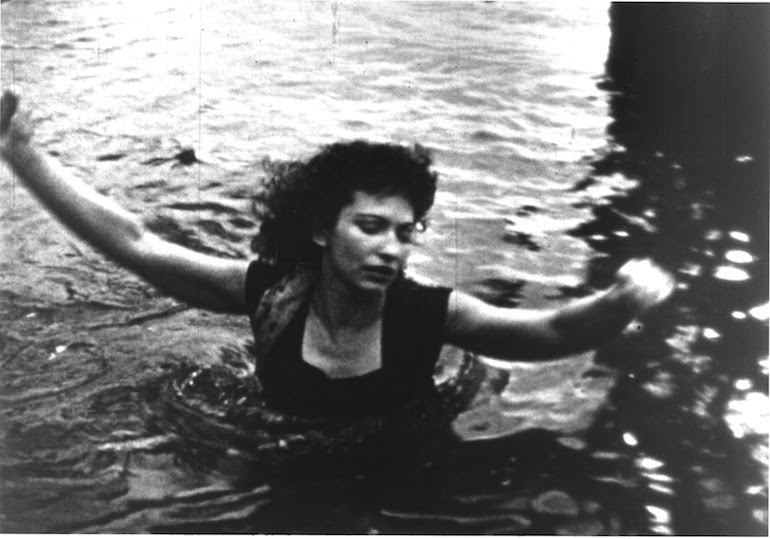ABOUT THE FEMENINE
Maya Deren
 FORWARD
FORWARD
 DOWNLOAD
DOWNLOAD

I think they are the films of a woman and I think that their characteristic time quality is the time quality of a woman. I think that the strength of men is their great sense of immediacy. They are a "now" creature and a woman has strength to wait, because she's had to wait. She has to wait nine months for the concept of a child. Time is built into her body in the sense of becomingness. And she sees everything in terms of it being in the stage of becoming. She raises a child knowing not what it is at any moment but seeing always the person that it will become. Her whole life from her very beginning it's built into her is the sense of becoming.
I think that my films putting as much stress as they do upon the constant metamorphosis one image is always becoming another. That is, it is what is happening that is important in my films not what is at any moment.
I intended it almost as a mythological statement in the sense that folktales are mythological archetypal statements. The girl in the film is not a personal person. She's a personage. […] Their Goddess of Love (Erzulie, in Voodoo) is a very fascinating and complex idea. She is, in fact, the goddess of all the luxuries, which are not essential to survival. She is the Goddess of Love, which unlike sex is not essential to propagation. She is the muse of the arts. Now, man can live without it, but he doesn't live very much as man without it. It is strange that one would have to go to an apparently primitive culture such as Haiti to find an understanding in such exalted terms of what the essential feminine not feminine role might conceivably be that of being everything which is human, everything which is more than that which is necessary. Taken from this point of view there is no reason in the world why women shouldn't be artists, and very fine ones.
Recording reproduced in the documentary In the Mirror of Maya Deren (Martina Kudlácek, 2001).
Nº 8 PORTRAIT AS AN ACTRESS, SELF-PORTRAIT AS A FILMMAKER
Editorial. Portrait as an actress, self-portrait as a filmmaker
Gonzalo de Lucas
DOCUMENTS
About the femenine
Maya Deren
About Fuses
Carolee Schneemann
Conversation about Wanda by Barbara Loden
Marguerite Duras and Elia Kazan
About the Film-Diary
Anne-Charlotte Robertson
Nothing to say
Chantal Akerman
FILMS UNDER DISCUSSION. INTERVIEWS
About the Women Film Pioneers Project
Alejandra Rosenberg
Medeas. Interview with María Ruido
Palma Lombardo
VIDEO ESSAY
Florencia Aliberti, Caterina Cuadros and Gala Hernández
ARTICLES
Lois Weber: the female thinking in movementWeber: the female thinking in movement
Núria Bou
‘One must at least begin with the body feeling’: Dance as filmmaking in Maya Deren’s choreocinema
Elinor Cleghorn
Nothing of the Sort: Barbara Loden’s Wanda (1970)
Cristina Álvarez López and Adrian Martin
The Trouble with Lupino
Amelie Hastie
Presence (appearance and disappearance) of two Belgian filmmakers
Imma Merino
Identity self-portraits of a filmic gaze. From absence to (multi)presence: Duras,Akerman, Varda
Lourdes Monterrubio Ibáñez
REVIEW
Jorge Oter; Santos Zunzunegui (Eds.) José Julián Bakedano: Sin pausa / Jose Julian Bakedano: Etenik gabe
María Soliña Barreiro

